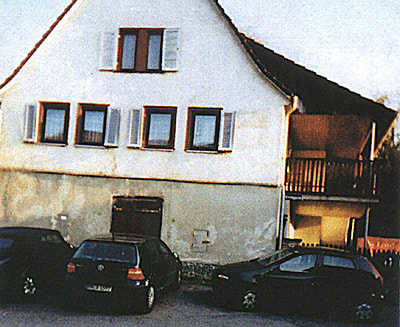
By Nancy Bruce
There were three Horine families who emigrated to America. All passed through or stayed in our area. One Horine who stayed was Johann Tobias Horine. He was born to Hans Adam Horine (1691-1772) and his wife Anna Catherine Crummin (1695-1790) on 5 May, 1725, in Grantschen, Heilbronn, Baden-Wuerttemberg, Germany, and arrived in Philadelphia on 17 November, 1749, on the ship Dragon.
While in Pennsylvania, Horine married Elizabeth Possert (1730-1773), the daughter of Jorg Possert (1700-1733). The couple's first child, Adam, was born 11 January, 1753, in New Hanover Township, Pennsylvania. This was followed by five daughters born between 1754 and 1765, then two more sons in 1766 and 1769, and a final daughter in 1771. Some of the daughters, it appears, did not live to adulthood.
Horine family researcher Eric Davis relays two pieces family lore concerning Horine that are of interest, although probably mostly apocryphal. First, it is said that Horine was the first white man to cross the mountains to the Middletown Valley. Second, after his arrival, Horine found an open meadow. From it, he cut and built a haystack, dug a little den under it, and spent the night with his wife and little child, probably their son Adam. The valley was yet home to Native Americans and during the night, some found the haystack and danced a War Dance around it. Johann and his wife were frightened, fearing that their little child might cry or make a noise that would betray them to the hostile Indians. But the hay house proved a complete deception to the Native Americans, who never suspected that there were white people hiding beneath it. The next morning, they returned to the colony at Frederick, but later established a permanent home near what would become Beallsville, now Harmony, where in 1754 he acquired an 81-acre parcel called "Johnson's Delight" from Thomas Johnson. Additionally, he obtained a 303-acre parcel on 24 May, 1764. Horine also built and ran a distillery for a number of years.
His Will, probated after his death on 21 October, 1773, directed that he be buried in Jerusalem Cemetery. He also directed that his daughters attend a German school until they were able to fully read the language, and that his sons Tobias and Samuel attend an English school "and instructed on the same until they have knowledge of the Rule of Three, commonly called the Golden rule."
Photo: Boyhood home of Johann Tobias Horine in Flien, Germany.
There were three Horine families who emigrated to America. All passed through or stayed in our area. One Horine who stayed was Johann Tobias Horine. He was born to Hans Adam Horine (1691-1772) and his wife Anna Catherine Crummin (1695-1790) on 5 May, 1725, in Grantschen, Heilbronn, Baden-Wuerttemberg, Germany, and arrived in Philadelphia on 17 November, 1749, on the ship Dragon.
While in Pennsylvania, Horine married Elizabeth Possert (1730-1773), the daughter of Jorg Possert (1700-1733). The couple's first child, Adam, was born 11 January, 1753, in New Hanover Township, Pennsylvania. This was followed by five daughters born between 1754 and 1765, then two more sons in 1766 and 1769, and a final daughter in 1771. Some of the daughters, it appears, did not live to adulthood.
Horine family researcher Eric Davis relays two pieces family lore concerning Horine that are of interest, although probably mostly apocryphal. First, it is said that Horine was the first white man to cross the mountains to the Middletown Valley. Second, after his arrival, Horine found an open meadow. From it, he cut and built a haystack, dug a little den under it, and spent the night with his wife and little child, probably their son Adam. The valley was yet home to Native Americans and during the night, some found the haystack and danced a War Dance around it. Johann and his wife were frightened, fearing that their little child might cry or make a noise that would betray them to the hostile Indians. But the hay house proved a complete deception to the Native Americans, who never suspected that there were white people hiding beneath it. The next morning, they returned to the colony at Frederick, but later established a permanent home near what would become Beallsville, now Harmony, where in 1754 he acquired an 81-acre parcel called "Johnson's Delight" from Thomas Johnson. Additionally, he obtained a 303-acre parcel on 24 May, 1764. Horine also built and ran a distillery for a number of years.
His Will, probated after his death on 21 October, 1773, directed that he be buried in Jerusalem Cemetery. He also directed that his daughters attend a German school until they were able to fully read the language, and that his sons Tobias and Samuel attend an English school "and instructed on the same until they have knowledge of the Rule of Three, commonly called the Golden rule."
Photo: Boyhood home of Johann Tobias Horine in Flien, Germany.
 RSS Feed
RSS Feed